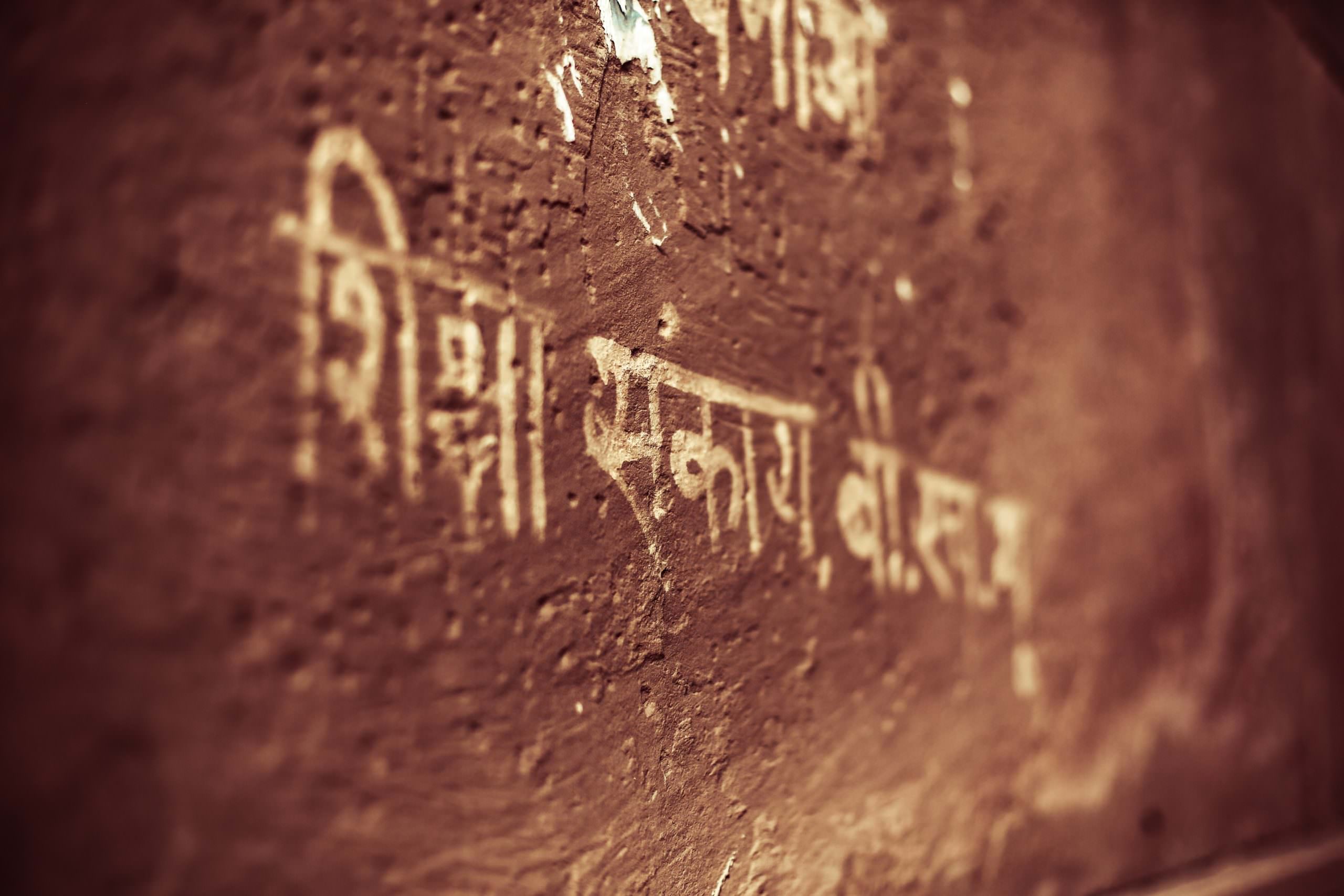
Sanskrit written on a wall. Photo by Charl Folscher.
By Victoria Andrews, Summer 2020 Student Grant Recipient
With a student grant from the Mittal Institute, I began my Sanskrit language training with the South Asian Summer Language Intensive (SASLI) during the summer of 2020. The unusual circumstances of the 2020 pandemic prompted me and the summer program to modify our plans for remote learning. In any other year, for my studies, I would have traveled to and lived in Madison, Wisconsin for the duration of the summer Sanskrit intensive. However, this year, I was able to video into my classes from Cambridge. Embarking on this linguistic endeavor has already proved fruitful for my studies this fall.
Learning and participating in this summer Sanskrit prepared me well for my fall language studies. Without this summer work, I would not have been as ready to advance my studies into more challenging domains. The course work began with the basics — the alphabet, consonant clusters, and spelling and grammar rules — but quickly moved into the more complicated aspects of Sanskrit.
By the end of the course, we were working on translating passages from both the Bhagavad Gita and Mahabharata. I feel incredibly fortunate to have had the summer to focus on my studies and learn from a truly exceptional Sanskrit teacher, even though the learning was virtual. Sanskrit’s enduring legacy and deep roots into ancient India gave an interesting perspective to consider the absurdity of learning this language system through a screen. In the grand scheme of Sanskrit’s history, this unexpected twist in the pedagogical format is but a blip, and I found comfort in considering this perspective.
Summer language programs sustain an intensity and rapid pace of learning that, while challenging to maintain, are incredibly and almost immediately gratifying. From week to week, the advancement in my learning and growth was evident. It was encouraging to look back each week at the previous week’s learning and feel a sense of understanding for that which had previously been so challenging and new. This marked sense of progress and accomplishment was very rewarding and motivating when I found myself stuck on certain lessons. Even still, noting that only a few months ago I knew no Sanskrit compared to where I am now, I’m reminded how fortunate I am to have had the opportunity to conduct these studies.
At the time, the regularity and repetition of my daily schedule made many of the days and weeks feel as though I were in a time loop, repeating that which I had already done. But when I look back on my summer, it is evident just how much I learned. By the end of the course, I was working with the instructor to find texts of greater interest to my studies on Indian art. While I have not yet been able to translate them with ease and produce a clean translation, I have (slowly) started reading them and noting repeat terms in an effort to expand my own vocabulary and understanding of words in varying contexts. Three months ago, I would not have thought that reading Sanskrit and recognizing words would ever be possible for me — but having a strong knowledge of the Sanskrit language is essential for both my studies and future career as a South Asian art historian.
Although we were unable to meet for class in person, and studying alone in Cambridge was an incredibly lonely experience, I was able to build some friendships with peers in the class through Zoom study sessions. In person, this classroom camaraderie would have been even more fruitful, but I am grateful for the friendships formed through these virtual study groups. As we moved from basic learning to more difficult grammar concepts and translating passages, this sense of community and teamwork was extremely beneficial. I found translating passages to be the most enjoyable part of the summer intensive. I had hoped to enter this stage of my Sanskrit abilities by the end of summer, but didn’t know if it would be possible. I look forward to continuing to examine texts closely and incorporate the lessons I learned this summer throughout the academic year in my own research.
